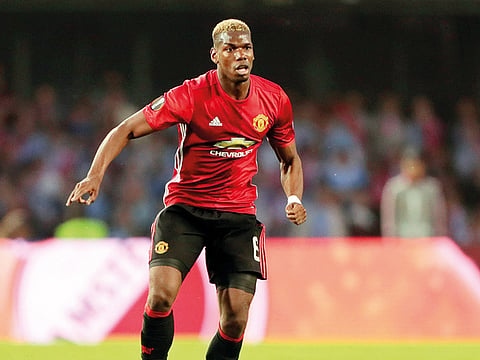Man Utd cannot rule England while they allow agents to call the tune
Paying alleged £367k a week to Ibrahimovic reveals how desperate club have become and the need to stop making transfer market mistakes

Manchester: A claim that Zlatan Ibrahimovic has been on £367,640 (Dh1.7 million) a week confirms that Manchester United entered an age of desperation, in which ‘super agents’ dangled them on a string.
This summer will tell us whether Britain’s biggest club can reclaim their independence and identity.
According to a book called ‘Football Leaks: The Dirty Business of Football’, based on investigate work by the Der Spiegel journalists Rafael Buschmann and Michael Wulzinger, Mino Raiola, Paul Pogba’s agent, could earn as much as £41 million from his client’s time in a United shirt: a £23 million cut of the £89 million transfer fee and five further payments of £16.39 million spread over Pogba’s five-year deal.
Der Spiegel also claims that Ibrahimovic, who joined on a free transfer, signed for a salary of £19 million a year, with a £2.86 million goals bonus — while Pogba accepted a lower weekly wage of £165,000, but with a 41-page contract loaded with incentives, including a “loyalty bonus” after just two seasons.
These astronomical sums confirm how loaded the top end of the market has become in favour of the most powerful agents.
Without these Faustian pacts, the top clubs will tell you, the best players would simply not cross the threshold. But they also say a lot about United’s tortured history since they last won the league in 2013.
Jose Mourinho’s club had missed out on a succession of marquee names and therefore signed their name in blood for Pogba and Ibrahimovic. The sense of drift post-Louis van Gaal was no longer tenable, and the Glazer family who own the firm needed gesture acquisitions to show United were still up there with the behemoths of Europe.
So how is all this shaping up? Not well, if you count their 51 goals in 35 fixtures, or consider the unedifying spectacle of the 13-time Premier League champions fielding a weakened team at Arsenal for the sake of a European tie on Thursday. A European tie, mark you, against a mediocre Celta Vigo side who had already been beaten 1-0 in Spain.
Jose Mourinho’s supporters say this was a rational calculation. United’s chances of reaching next year’s Champions League were higher through the Europa League route. Seeing off Celta Vigo and probably Ajax was more likely than pegging back Liverpool and Manchester City.
That case can be made. But surely United should not be sending weakened teams to Arsenal, where battle is meant to rage?
If Mourinho was playing politics with his own board (a variation on, ‘Give me the tools and I’ll complete the job’) he can hardly accuse Old Trafford’s overlords of parsimony in the transfer market.
Sunday’s 2-0 defeat will of course return to haunt Mourinho should the Europa League master plan not work out, especially as United were so negative in the game itself. It was a performance to make the club’s followers doubt all over again whether he is the right man for the rebirth. Curiously, Mourinho is heading for his first non-top-three finish in English football.
But there is a counterpoint, as the Pogba and Ibrahimovic figures show. As a club, United have been chasing their losses, throwing good money after bad. Pogba’s £89 million fee was gesture politics after Gareth Bale and Neymar stayed out of reach.
Ed Woodward, the chief executive, had taken enough hard knocks in the transfer labyrinth and needed to get a grip. He did so by overpaying for Pogba and giving Ibrahimovic whatever he asked for to solve United’s striker shortage — itself caused by excessive generosity to Wayne Rooney and an inflated estimate of Anthony Martial’s talent. Hence the desperation, last summer: the subservience to Raiola, and the previous eagerness to please Jorge Mendes, Mourinho’s agent.
None of this is healthy.
United cannot dominate English football again if their transfer business is shaped solely by agent power, or the need to correct past errors. And those errors were plentiful, especially under Van Gaal.
Memphis Depay, Morgan Schneiderlin, Luke Shaw, Bastian Schweinsteiger, Daley Blind and arguably Martial were all low-impact buys. Or no impact, in Depay’s case.
An area where Mourinho deserves credit is the improvement in several of the players he has worked with this term: Marcos Rojo, Ander Herrera, Jesse Lingard, Eric Bailly and Marcus Rashford.
Mourinho is on largely new territory: that of clearing up someone else’s mess. His janitorial style, though, is testing the patience of the crowd, who suspect he is temperamentally averse to bold, creative play.
This week he has been unfavourably compared to Chelsea’s Antonio Conte, a zealot defensively but also a manager who demands fast, high-intensity attacking. Thirteen draws for United — 10 at home — tend to suggest inbuilt caution.
Part of the answer, as ever, is Himalayan spending, and if United are indeed on course to report record revenue of £540 million and a £180 million profit then they can afford to throw £200 million at Willian, Michael Keane, Antoine Griezmann and Eric Dier. Or even Gareth Bale. All are reported transfer targets.
Any additions United make will have to be correct football judgements, not leaps into the arms of agents.
After one top-four finish in four seasons (probably), corporate and commercial considerations can no longer shape United’s transfer trading. If they stop making mistakes, they will stop needing to correct them; stop having to play weakened teams at Arsenal, or pay pounds 367,640 a week, allegedly, to 35-year-olds.
— The Telegraph Group Ltd, London 2017



